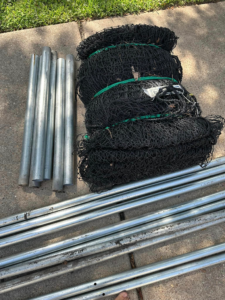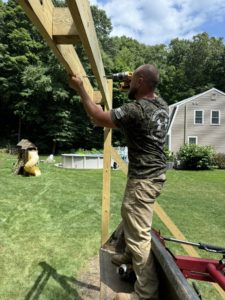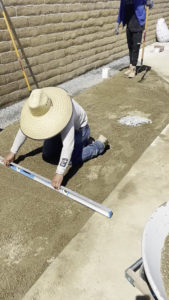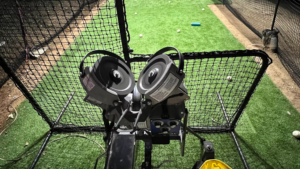How Much Does a Backyard Batting Really Cage Cost?
If you’re planning to build a backyard batting cage, you’re likely asking the big question: how much will it cost? The truth is, it depends on several key factors including size, materials, installation method, and extra features like lighting or pitching machines. This complete breakdown will help you understand what to expect at every price point—and how to get the best return on your investment.
For answers to all your general batting cage questions, we recommend checking out our popular article: Building a Backyard Batting Cage: Top FAQs Answered.
1. Cage Size
- Standard Sizes: 35–70 feet long, 12–14 feet wide, and 10–12 feet high—ideal for most home builds.
- Custom Sizes: Some builders opt for 20-foot cages in small spaces or full 100-foot cages for pro-style training.

2. Frame and Netting Materials
- Frame Options:
– PVC: Low cost, easy to assemble, but less durable.
– Aluminum: Lightweight and rust-resistant, a step up in longevity.
– Steel: Heavy-duty and built to last—ideal for frequent use. - Netting Types:
– Polyethylene: Budget-friendly, best for light use.
– Nylon: Durable and great for moderate to heavy training.
– Kevlar: Top-tier netting, extremely strong and long-lasting.

Want to go deeper? Read our guide on Choosing the Right Batting Cage Netting.
3. Installation Options
- DIY Installation: Great for budget builds. Most kits include setup instructions and save you hundreds.
- Professional Installation: Faster and safer. Expect to pay more but with a polished, secure result.


Still unsure? Read our side-by-side comparison: DIY vs Pro Installation.
4. Extra Features
- Pitching Machines: Basic models start at $500. Pro-grade machines can exceed $2,000.
- Lighting: $200 for a DIY floodlight setup, or $1,000–$3,000 for installed LED systems.
- Protective Screens & Padding: $200–$1,000 based on size and quality.
Need gear? We trust Shopisa and Batting Cages Inc for pro-level equipment.

Batting Cage Cost Tiers
Budget Builds ($500–$1,500)
- Materials: PVC or aluminum frame with polyethylene netting
- Size: Typically 35 feet long
- Setup: DIY assembly kits
- Pros: Affordable, easy to set up, portable
- Cons: Not durable in harsh weather, limited features
Mid-Range Cages ($1,500–$5,000)
- Materials: Steel frame with nylon netting
- Size: Around 55 feet long
- Setup: DIY or pro install options
- Pros: Good longevity, optional pitching machine, lighting upgrades
- Cons: More upfront cost, may require tools or professional help
Premium Setups ($5,000–$15,000+)
- Materials: Galvanized or coated steel with Kevlar or premium nylon netting
- Size: Custom sizing (up to 100 feet)
- Setup: Professionally installed and fully anchored
- Features: Advanced pitching machines, LED lighting, custom flooring
- Pros: Maximum durability and performance
- Cons: High investment, but often the best long-term value
Why Quality Pays Off
- Longevity: Spend once, use for years—especially with steel and Kevlar builds
- Safety: Better gear = fewer injuries
- Experience: A pro-grade cage transforms backyard practice into serious training
- Home Value: A well-designed cage adds a unique edge to your property
Final Thoughts
The cost to build a backyard batting cage can vary widely—but with the right plan, materials, and setup, it’s one of the most rewarding investments a ballplayer can make. If you’re building one yourself, be sure to check out our Batting Cage Guide Library.
And when your cage is ready, don’t forget—you can list it on CageList and earn passive income by renting it out by the hour. Learn how it works here.
